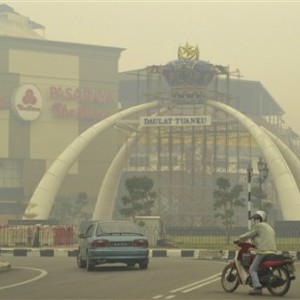
A motorist wears a face mask as he rides through a town shrouded with thick haze in Muar, northwestern Johor, Malaysia, in this June 22, 2013, photo. Malaysia’s economy grew 4.3 percent in the second quarter, slowing considerably on a year-on-year basis and prompting the central bank Wednesday to lower its full-year growth forecast. AP PHOTO
KUALA LUMPUR—Malaysia’s economy grew 4.3 percent in the second quarter, slowing considerably on a year-on-year basis and prompting the central bank Wednesday to lower its full-year growth forecast.
The pace of growth announced by Bank Negara fell short of analysts’ forecasts, and was down from 5.4 percent growth in the second quarter of 2012.
Bank Negara blamed slack external demand for Malaysian goods due to global economic weakness and said it had revised its growth projection for the year to 4.5-5.0 percent.
It had previously set a forecast of 5-6 percent.
“While domestic demand is expected to remain firm… the weak external sector in the first half of this year will affect our overall growth performance for the year,” the central bank said in a statement.
Malaysia’s performance has slowed from a 2012 fourth quarter in which Southeast Asia’s third-largest economy expanded by a surprising 6.4 percent, its best showing in more than two years.
The central bank said domestic demand growth of 7.3 percent had lent support in the second quarter.
Prime Minister Najib Razak’s government pumped huge amounts of money into the economy via investment drives and cash handouts to voters ahead of hotly contested May general elections that were won by his long-ruling coalition.
But exports have steadily softened this year. They contracted 6.9 percent in June, the fifth straight month of decline.
A poll by Dow Jones Newswires of 15 economists before the second quarter data came out had yielded a median forecast of 4.7 percent growth.
Najib campaigned on a record of steady economic stewardship and a promise to turn Malaysia into a “high-income developed nation” by 2020.
The government has promised major infrastructure projects and financial market liberalization to attract foreign investment and boost growth in order to reach that goal.